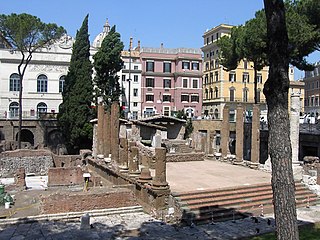Related Research Articles
Gaius Suetonius Tranquillus, commonly known as Suetonius, was a Roman historian who wrote during the early Imperial era of the Roman Empire.
Quintus Remmius Palaemon or Quintus Rhemnius Fannius Palaemon was a Roman grammarian and a native of Vicentia. He lived during the reigns of Emperors Tiberius and Claudius.

The gens Julia was one of the most ancient patrician families in ancient Rome. Members of the gens attained the highest dignities of the state in the earliest times of the Republic. The first of the family to obtain the consulship was Gaius Julius Iulus in 489 BC. The gens is perhaps best known, however, for Gaius Julius Caesar, the dictator and grand uncle of the emperor Augustus, through whom the name was passed to the so-called Julio-Claudian dynasty of the first century AD. The nomen Julius became very common in imperial times, as the descendants of persons enrolled as citizens under the early emperors began to make their mark in history.
The gens Scribonia was a plebeian family at ancient Rome. Members of this gens first appear in history at the time of the Second Punic War, but the first of the Scribonii to obtain the consulship was Gaius Scribonius Curio in 76 BC.

The gens Lutatia, occasionally written Luctatia, was a plebeian family of ancient Rome. The first of the gens to obtain the consulship was Gaius Lutatius Catulus in 242 BC, the final year of the First Punic War. Orosius mentions their burial place, the sepulchrum Lutatiorum, which lay beyond the Tiber.
Marcus Antonius Gnipho was a grammarian and teacher of rhetoric of Gaulish origin who taught in ancient Rome.

De viris illustribus is an unfinished collection of biographies, written in Latin, by the 14th century Italian author Francesco Petrarca. These biographies are a set of Lives similar in idea to Plutarch's Parallel Lives. The works were unfinished. However he was famous enough for these and other works to receive two invitations to be crowned poet laureate. He received these invitations on exactly the same day, April 8, 1341, one being from the Paris University and the other from the Roman Senate. He accepted the Roman invitation.
The gens Octavia was a plebeian family at ancient Rome, which was raised to patrician status by Caesar during the first century BC. The first member of the gens to achieve prominence was Gnaeus Octavius Rufus, quaestor circa 230 BC. Over the following two centuries, the Octavii held many of the highest offices of the state; but the most celebrated of the family was Gaius Octavius, the grandnephew and adopted son of Caesar, who was proclaimed Augustus by the senate in 27 BC.

Education in ancient Rome progressed from an informal, familial system of education in the early Republic to a tuition-based system during the late Republic and the Empire. The Roman education system was based on the Greek system – and many of the private tutors in the Roman system were Greek slaves or freedmen. The educational methodology and curriculum used in Rome was copied in its provinces and provided a basis for education systems throughout later Western civilization. Organized education remained relatively rare, and there are few primary sources or accounts of the Roman educational process until the 2nd century AD. Due to the extensive power wielded by the paterfamilias over Roman families, the level and quality of education provided to Roman children varied drastically from family to family; nevertheless, Roman popular morality came eventually to expect fathers to have their children educated to some extent, and a complete advanced education was expected of any Roman who wished to enter politics.
The gens Afrania was a plebeian family at Rome, which is first mentioned in the second century BC. The first member of this gens to achieve prominence was Gaius Afranius Stellio, who became praetor in 185 BC.

The gens Pomponia was a plebeian family at ancient Rome. Its members appear throughout the history of the Roman Republic, and into imperial times. The first of the gens to achieve prominence was Marcus Pomponius, tribune of the plebs in 449 BC; the first who obtained the consulship was Manius Pomponius Matho in 233 BC.
The gens Pompilia was a plebeian family at ancient Rome during the time of the Republic. The only member of the gens to attain any prominence in the Roman state was Sextus Pompilius, who was tribune of the plebs in 420 BC; however, persons by this name are occasionally found throughout the history of the Republic.
The gens Crassicia, occasionally written Crassitia, was a minor plebeian family at ancient Rome. Few members of this gens are mentioned in history, and it is best known from a single individual, Lucius Crassitius, a freedman and a Latin grammarian.
The gens Rutilia was a plebeian family at ancient Rome. Members of this gens appear in history beginning in the second century BC. The first to obtain the consulship was Publius Rutilius Rufus in 105 BC.
Scribonius Aphrodisius was grammarian of ancient Rome. He was originally a slave and disciple of the grammarian Lucius Orbilius Pupillus, who was also the teacher of the Roman poet Horace. He was purchased by Scribonia, the second wife of the emperor Augustus, and was by her manumitted. She may have purchased him to educate her children, or possibly herself.
The gens Oppia was an ancient Roman family, known from the first century of the Republic down to imperial times. The gens may originally have been patrician, as they supplied priestesses to the College of Vestals at a very early date, but all of the Oppii known to history were plebeians. None of them obtained the consulship until imperial times.
The gens Orbilia was an obscure plebeian family of ancient Rome. None of its members are known to have held any magistracies. Its most famous representative may have been the grammarian Lucius Orbilius Pupillus, who operated a school at Rome, and was the master of Horace.
The gens Remmia, occasionally written Remia, was an obscure plebeian family at ancient Rome. Only a few members of this gens are mentioned in history, of whom the most illustrious was the grammarian Quintus Remmius Palaemon, but many others are known from inscriptions.
The gens Sallustia, occasionally written Salustia, was a plebeian family at ancient Rome. Members of this gens are first mentioned in the time of Cicero, and from that time they attained particular distinction as statesmen and writers. The most illustrious of the family was the historian Gaius Sallustius Crispus, who wrote valuable works on the Jugurthine War and the Conspiracy of Catiline, which still exist.
The gens Staberia was a minor plebeian family at ancient Rome. Members of this gens are first mentioned in the final decades of the Republic, but they never achieved much importance. The most illustrious of the Staberii may have been the Grammarian Staberius Eros, though he was a freedman. One of this family served as a military tribune in the time of Vespasian, but none of the Staberii obtained any of the higher offices of the Roman state; the consul Marcus Pompeius Silvanus Staberius Flavianus belonged to the Pompeia gens, although he was probably descended from the Staberii through a female line.
References
- 1 2 3 4 McNelis, C. (2007) "Grammarians and rhetoricians" in Dominik, W. and Hall, J. (eds.) A companion to Roman rhetoric. Oxford: Blackwell Publishing, pp. 285-296. ISBN 978-1-4051-2091-3
- ↑ Quintilian, Inst. 1.4.2
- ↑ Suetonius. Iul. 42.1, Aug. 42.3
- ↑ Suetonius. Gram. 7.2
- ↑ Suetonius. Gram. 6.1, 10.1, 11.1, 12.1, 13.1, 15.1, 16.1, 17.1, 18.1, 19.1, 20.1, 23.1.